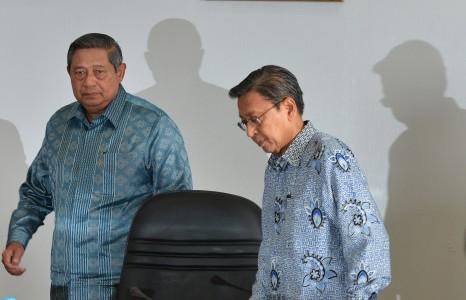Indonesia's next president faces fuel subsidy headache
• 21 May 2014

Presiden Susilo Bambang Yudhoyono (kiri) bersiap memimpin rapat kabinet (ANTARA FOTO/Widodo S. Jusuf)
This year's widening deficit is mainly due to a projected increase in oil subsidies to 285 trillion rupiah
Bareksa.com - Indonesia's next president will need to quickly tackle a growing fuel subsidy problem, as the country's budget deficit draws uncomfortably close to the legally-binding limit of 3 percent of gross domestic product.
Outgoing President Susilo Bambang Yudhoyono on Tuesday proposed a revised 2014 budget that sees a much wider fiscal deficit than initially forecast - thanks largely to high fuel-subsidy costs - and he decreed some spending cuts to help contain the budget gap.
The ballooning subsidy cost has become a major economic issue for the two presidential candidates ahead of the July 9 election. Both agree the government's fuel bill must be reduced, but have different solutions for the problem.
In his revised budget proposal, Yudhoyono estimated that this year's fiscal deficit will be 2.5 percent of GDP, much larger than the initial forecast of 1.69 percent. It also projected a 2015 budget deficit at between 1.7 and 2.5 percent.
Last year, Yudhoyono was forced to hike fuel prices to keep the budget deficit below the 3 percent threshold. In the end, the deficit during 2013 was 2.38 percent of GDP.
This year's widening deficit is mainly due to a projected increase in oil subsidies to 285 trillion rupiah ($24.96 billion) - more than 15 percent of the total budget - from an initial estimate of 210.7 trillion rupiah.
SOME CUTS IN SPENDING
To help offset some of the higher fuel costs, the president's decree cuts the budgets of a number of ministries, saving around 100 trillion rupiah. But even with those cuts, total spending will be higher than originally planned, thanks to the fuel subsidies.
"We are open to all options on cutting subsidies," chief economic minister Chairul Tanjung, who was appointed last week to fill a vacancy, told reporters. "If it's impossible for this government, then we will prepare for the next government."
The new government will take over in October.
For months, presidential contest frontrunner Joko "Jokowi" Widodo has maintained a significant lead over ex-general Prabowo Subianto in opinion polls. But the election turned into a tight race on Monday after the country's No. 2 party unexpectedly switched its support from Jokowi to his main rival.
Economists prefer Jokowi's plan to slowly reduce fuel subsidies over the next few years, which could save the government $30 billion in costs.
Prabowo aims to keep fuel prices at current rates but impose measures to ensure the subsidies are only used by the poor and lower middle class. Analysts think this option would be too difficult to effectively implement. (Source : Reuters)